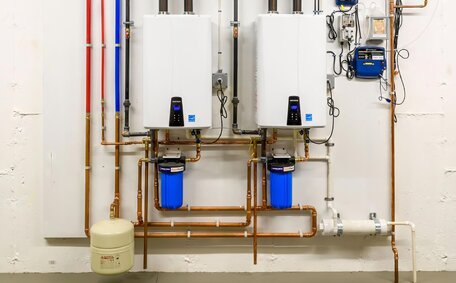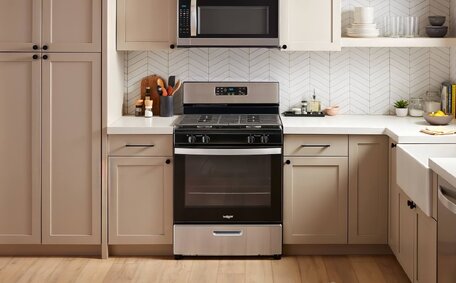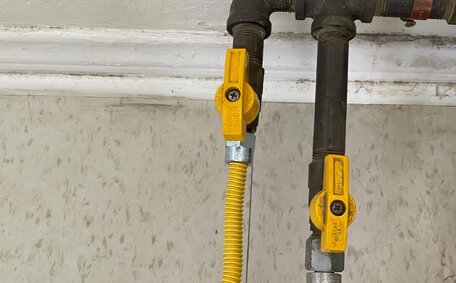
How Hard Water Hurts Hot Water Heaters
Hard water leaves mineral deposits in heaters, pipes and tanks. This limescale reduces efficiency, lifespan and hot water availability. Contact us for affordable water softening solutions.
Read MoreBlocked drains are a significant issue in public restrooms with high traffic flow. At our plumbing company servicing Picnic Point, Sydney, we understand the importance of maintaining fully operational drainage and wastewater systems to ensure functionality and cleanliness for patrons and staff.
Public restroom drainage blockages require immediate action because you want to make sure to make swift decisions to restore flow and sanitary conditions. If left unchecked, clogged pipes can lead to foul odours, flooding, and closure of facilities. By identifying common causes of clogged drains, signs, and methods for clearing obstructions, our plumber’s expertise can repair issues promptly.
In this comprehensive guide, we discuss the top causes of drain blockages in public restrooms and prevention methods. We also cover signs of potential obstructions to monitor, as well as the most effective drain cleaning techniques our licenced Sydney plumbers use to clear clogs and restore proper wastewater flow.
In a commercial kitchen, grease and soap scum are among the common cause of clogs, frequently leading to a blocked drain. As grease cools, it solidifies and invites organic matter to coat the insides of pipes. Over time, thick layers of grease accumulate and they grow, leading to the blockage often completely obstructing drains.
Nearby, your kitchen sink contributes to grease-related obstructions encountered by our Picnic Point public restroom facilities.
Leftover scraps washed down sinks are another major source of drain blockages, which leads to a blocked sink as items like rice, pasta, or vegetables accumulate and form clogs. These scraps then break down when wet and stick to pipe walls, slowly forming obstructions.
In public restrooms, stray food debris carried in on shoes or clothing is an example of how drains can become obstructed.
Improperly disposed items such as toilet paper, wipes, feminine hygiene products, and children’s toys that get flush down the drain become typical causes of blocked drains.
Toilet users may inadvertently flush inappropriate items, causing a blocked toilet when items get lodged in the bends. Sink users could also drop small objects down drains. In facilities like public restrooms, lack of education around proper disposal results in preventable obstructions.
Grease build up can also cause ongoing maintenance challenges in public restroom drains. As grease discharged from nearby kitchens cools, it coats the inside of wastewater pipes. Over time, thick grease deposits narrow the pipe opening, eventually blocking water flow entirely.
Our Picnic Point plumbers often clear grease-related clogs using hydro jetting. Our Picnic Point plumbers often clear grease-related clogs using hydro jetting.
High-pressure water propels through the drain, scouring pipe walls to dislodge greasy layers. High-pressure water propels through the drain, scouring pipe walls to dislodge greasy layers.
Facility managers can get a relief gully as an extra measure, especially when blocked, along with regular hydro jetting for areas like the kitchen and bathroom to prevent excessive grease buildup. Our plumbers also recommend installing grease traps in your kitchen and bathroom to capture waste oil and fats before they can enter your drains. Proactive maintenance like grease trap cleaning by Sydney Water reduces blockage incidents and helps to keep your plumbing in prime condition.
Food scraps washed down sinks after you remove cap are likely your blockage origins in public restrooms. Stray rice, noodles, or vegetable pieces can get inside pipes easily after being carried into bathroom sinks on shoes or clothing. Wet food remnants then accumulate into the drain and onto pipe walls, which can restrict wastewater flow over time if not promptly removed.
As licenced Sydney plumbers specialising in drain unblocking, we can try to clear food scrap-related obstructions using high-powered water jetting. Scouring pipes removes debris and also cleans off pipe walls for improved wastewater flow. We recommend managers arrange regular maintenance checks to capture food scrap buildup early before major blockages occur.
Workers and cleaners should also consider what can do to thoroughly clear food scraps that can cause blockage before they flush down the sink and into bins to prevent transfer and contamination in restrooms. Installation of drain screens can do the trick by adding another layer of protection by catching stray debris. With vigilance and routine pipe inspections, your bathroom facilities can curb scrap-related clogging.
Public restrooms face ongoing issues like bacterial growth due to inappropriate items being flushed or washed down drains. Common foreign objects find their way into drains contributing to blockages and include paper towel remnants, wet wipes, feminine hygiene products, and children’s toys. These items easily become lodged in bends and are common causes blocked drains, resulting in disruptions to wastewater flow.
At our Picnic Point plumbing company, We are committed to fix your drains, ensuring clearage from blockages caused by these objects using manual retrieval or water jetting.
However, those who use drain awareness and understand what can and can’t be flushed, practicing vigilant monitoring, are key to preventing blockages. Managers should make sure signs illustrate the wrong things to dispose down sinks or toilets to prevent clogs. Routine drain inspections also help capture foreign objects before major obstructions occur. Routine drain inspections also help capture foreign objects before major obstructions occur.
There are several warning signs blocked drain indicating a potential blockage in your public restroom facilities:
Observe sink and toilet drainage rates. Sluggishly draining water often signals an obstruction forming.
Food scraps, grease or other debris likely started accumulating inside pipes. Food scraps, grease or other debris likely started accumulating inside pipes.
Listen for gurgling sounds from the shower drain as water and potential blockages make their way into the pipes. Air bubbles squeeze past debris stuck along pipe walls, making glugging noises.
This indicates blockages narrowing pipe capacity. This indicates blockages narrowing pipe capacity.
Foul odours prompting the query, 'why does my drain smell?' can often indicate underlying issues such as sewage coming up through your sewer drain system. As water in your drains backs up and then goes down slowly, accumulated sewage can cause blocked pipes, releasing unpleasant odours into restrooms. Bad smells alert managers to check systems for obstructions before spillage or backups occur.
Acting quickly when I am faced with blocked drainage problems prevents severe plumbing damages, and a licensed plumber can address these swiftly. Get your licenced Sydney plumber for assessments. Advanced diagnostics like CCTV inspections also help to find out where your piping may be hiding suspected clogs.
Arranging routine drain cleaning helps avoid obstructions from tree roots that may infiltrate and compromise public restroom plumbing. Our licenced Sydney plumbers recommend scheduling appointments every 3 months to get rid of grease, debris, and other buildup. High pressure jet washing scours pipe interiors, doing more than just superficial cleaning, while CCTV inspections assess drainage systems.
Proper ventilation helps to clear blocked odours, including any sewer smell, and maintains the water level in slow-draining pipes. Carry out checks to ensure exhaust fans are operating optimally to ventilate restrooms.
Floor drains also require sufficient air flow to prevent foul gases from blocked sewer lines entering facilities. Contact your Picnic Point plumber to install or repair ventilation as needed.
Preventive CCTV drain inspections enable early detection of potential obstructions. High-tech cameras feed back live footage revealing debris accumulation, grease buildup, and damage.
Acting promptly on inspection findings helps ensure your plumbing remains clear, sniffing out where major blockages may be forming and enabling you to find potential problem areas early. Arrange periodic CCTV drainage checks for monitoring.
Establishing a regular drain cleaning schedule is critical for preventing blockages in public restroom facilities. As licenced Sydney plumbers, we get the job done right, recommending managers arrange professional drain jetting and CCTV inspections every 3 months.
Routine maintenance works to prevent buildup of accumulated grease, food scraps, and other debris before major obstructions occur. High pressure water jetting scours pipe interiors, while camera inspections assess drainage systems to capture issues early.
Preventative drain servicing avoids costly plumbing repairs from severe clogs and backups. With regular upkeep, cause your facilities to uphold proper flow and sanitation in both private wastewater and public systems for patrons’ health and safety.
Proper ventilation is critical to prevent blocked drain odours originating in public restroom facilities. Ensure exhaust fans are operating optimally to ventilate rooms. Malfunctioning fans allow sewer gas buildup from drainage system issues.
Floor drains also require sufficient air circulation to avoid bad smells entering the premises. As your licenced Sydney plumbers, we advise using drain cleaner with care and checking ventilation shafts and vents for any obstructions too. Contact us to install or repair ventilation as needed to improve air flow.
With adequate ventilation controlling odours, managers can use their senses, including smell your drains, as an early warning for potential drain clogs. Swift action on foul odours can save the day by clearing obstructions before water backup occurs in the restrooms.
CCTV drain inspections are an invaluable preventative maintenance tool for facility managers. High-tech cameras feed back live footage from inside pipes, clearly revealing any debris accumulation, grease buildup, damage, or root infiltration issues.
By acting promptly on potential problems identified in your drain via CCTV, there no excuses for facilities to have major drainage blockages and backflows requiring expensive repairs. We recommend managers arrange periodic CCTV drain checks every 3 months as part of a comprehensive maintenance programme.
Our licenced Sydney plumbers also confirm plumbing fixtures and drainage systems are cleared to prevent blocked drains using CCTV cameras after hydro jetting sessions. CCTV allows plumbers to validate full wastewater flow has been restored before signing off jobs.
Early intervention on issues spotted via CCTV camera translates to well-functioning, obstruction-free plumbing for your public restrooms. Contact your plumber in Picnic Point to schedule inspections ensuring drainage remains clear.
Ensure proper seal around the toilet plunger over drain opening before pumping vigorously 10-15 times to dislodge debris.
Take care not to scratch enamel surfaces. Plunging can clear minor sink clogs in public restrooms. Plunging can clear minor sink clogs in public restrooms.
Before using a drain snake, it may be beneficial to use plunger techniques to attempt dislodging the obstruction. Our licenced plumbers advise caution with in-house snaking, which can do wonders to avoid damage to your blocked drain. For severe or recurring clogs, try using a professional plumber to correctly identify blockage type and location before snaking.
Our Picnic Point plumbers use industrial jetters to scrub away years of accumulated grease, waste and debris that routine snaking cannot remove.
Pondering 'why does my drain require such force?': Highly pressurised hot water blasts through pipes, scouring interiors to cleanse thoroughly. Hydro jetting restores how much full wastewater flow you have. Hydro jetting is the most thorough and effective method for dealing with stubborn clogs in drain clearing.
For minor sink clogs in public restrooms, a plunger can effectively clear buildup before it causes major blockages. For minor sink clogs in public restrooms, a plunger can effectively clear buildup before it causes major blockages.
The suction can fix blocked drains by dislodging debris stuck along pipe walls. Take care not to scratch enamel surfaces while plunging. Seek professional drain cleaning assistance if the drain is still blocked after plunging fails to restore proper drainage.
Effective use of a plunger, avoiding common mistakes like inadequate seals or weak force, can resolve drain clogs. Our licenced Sydney plumbers do not advise ad-hoc chemical drain treatments combined with plunging. For severe or recurring clogs, call a qualified plumber to properly identify the blockage type and location before attempting to plunge drains.
Harsh chemicals used in drain cleaners can corrode pipes, especially when using them improperly as non-professionals.
Snaking a drain involves sending a long, flexible auger down the pipe to hook and extract lodged objects causing a blockage. Our licenced Sydney plumbers might suggest safe alternatives like a blend of boiling water and baking soda rather than hazardous chemicals, to avoid potential pipe damage.
For severe or recurring clogs, it’s wise to call plumber to correctly identify the blockage type and location before snaking. A plumber can also advise if the drain can be cleared using snaking as the most suitable method or if alternative solutions like hydro jetting would be more effective.
When snaking drains, Take care not to scratch pipe interiors or send augers down your pipes incorrectly. If you encounter strong resistance, do not force through blockages yourself but allow a licenced technician to handle it safely. Improper snaking can cause damage not only to your pipes but also to our network of sewage systems, causing obstructions to embed further and exacerbate flow issues.
Hydro jetting is the most effective method for clearing stubborn drain clogs, especially grease blockages common in plumbing systems similar to those in your home. Highly pressurised water is blasted through pipes to scour interiors and flush out years of accumulated grease, waste and debris.
We are determined to ensure our licenced Sydney plumbers use industrial-grade jetters and nozzles to penetrate grease layers and scrub drains thoroughly. The intense water jets clear blockages that routine augering or snaking often cannot remove fully. Hydro jetting restores complete wastewater flow by cleaning the full circumference of pipe walls.
We advise that only licenced technicians attempt hydro jetting to avoid the potential risk that could damage your pipes from improper use of high-pressure jetting equipment. Contact your local Picnic Point plumber to schedule hydro jetting if you suspect a persistent grease-related or debris clog in your public restroom drains.
For recurring or severe drainage blockages in your public restroom facilities, professional assistance is essential. As your experienced Picnic Point plumbers, We have the capabilities and being used equipment to comprehensively address persistent clog issues.
Our licenced technicians know how fix stubborn accumulations of grease, waste, and debris with high-powered hydro jetting. Customised drain treatment solutions can also remediate ingrained issues in ageing or damaged pipes.
We further investigate root causes via CCTV drain inspections, recommending repairs like pipe relining to prevent repeated blockages. With our end-to-end services restoring and protecting your wastewater systems, facilities maintain operational plumbing despite heavy patron loads.
Dealing with a blocked drain in public restrooms carries important health and safety considerations. Facility managers should ensure workers handle drain cleaners with care, donning protective equipment to prevent contact or inhalation.
To curb health risks from sewage contamination, act swiftly to clear blocked drains instead of allowing backups to water your property. Place clear signage advising against flushing inappropriate items, as what goes down toilet can commonly cause clogs requiring hazardous drain cleaning methods.
Left unchecked, drain blockages can expose your property to damage from water leaks or pipe bursts under pressure. Flooding also creates slippery hazards. By arranging regular maintenance like jetting or CCTV inspections, facilities make owners responsible for preemptively avoiding health dangers and plumbing repairs from severe clogs which could cause sewage to back up.
Hard water leaves mineral deposits in heaters, pipes and tanks. This limescale reduces efficiency, lifespan and hot water availability. Contact us for affordable water softening solutions.
Read MoreIt’s important to routinely check your gas appliances for any issues. Signs of problems include gas leaks, strange sounds, odd smells and more. Have a professional inspect your gas appliances annually and service them regularly for safety.
Read MoreUpgrading your gas meter is a simple process completed by registered technicians. It involves disconnecting your gas supply for 15 minutes to swap the old meter for a new digital smart meter. The upgrade is free and improves accuracy.
Read MorePicnic Point, 2213 NSW
We will call back as soon as possible.




